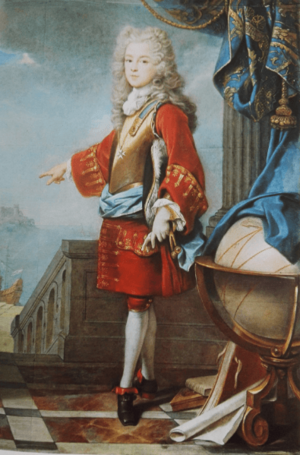Joseph Ferdinand of Bavaria facts for kids
Quick facts for kids Joseph Ferdinand |
|
|---|---|
| Electoral Prince of Bavaria | |

Josef Ferdinand by Joseph Vivien in 1698
|
|
| Born | 28 October 1692 Hofburg Palace, Vienna |
| Died | 6 February 1699 (aged 6) Brussels, Spanish Netherlands |
| House | House of Wittelsbach |
| Father | Maximilian II Emanuel |
| Mother | Maria Antonia of Austria |
| Religion | Roman Catholicism |
Joseph Ferdinand Leopold of Bavaria (born October 28, 1692 – died February 6, 1699) was a young prince who almost became the King of Spain. He was the son of Maximilian II Emanuel, Elector of Bavaria, and his first wife, Maria Antonia of Austria. His mother was the daughter of Leopold I, Holy Roman Emperor, and the granddaughter of King Philip IV of Spain. This made Joseph Ferdinand very important in the royal families of Europe.
Contents
Early Life of Prince Joseph Ferdinand
Prince Joseph Ferdinand was born in Vienna, Austria, on October 28, 1692. His father was Duke Maximilian II Emanuel, Elector of Bavaria. His mother was Archduchess Maria Antonia, the daughter of Emperor Leopold I. This meant Joseph Ferdinand was also a great-grandson of King Philip IV of Spain. He was also a great-nephew of Charles II of Spain.
Sadly, his mother died shortly after he was born. Joseph Ferdinand was then cared for by his grandfather, Emperor Leopold I. His father was busy serving as the governor of the Spanish Netherlands in Brussels. In May 1693, young Joseph Ferdinand moved from Vienna to Munich, Germany.
Becoming Heir to the Spanish Throne
Joseph Ferdinand became very important because of who his family was. The King of Spain, Charles II of Spain, had no children. This meant someone else had to be chosen to inherit his throne. Joseph Ferdinand was a strong candidate because he was related to the Spanish royal family through his mother and grandmother.
Many Spanish nobles supported Joseph Ferdinand. They were not happy with the German relatives of Charles II's wife, Mariana of Neuburg. Joseph Ferdinand's grandmother, Maria Antonia, had given up her rights to the Spanish throne. But this was done under pressure from her father, Emperor Leopold I.
This situation caused a lot of tension in the Spanish court. There were many political arguments and secret plans. Some people even rumored a plot to bring Prince Joseph Ferdinand to Madrid. The idea was to make him king with his grandmother as his regent (someone who rules for a young king).
In May 1696, Charles II's mother died. Before she passed away, she helped make sure Joseph Ferdinand was named as the heir. In September 1696, King Charles II officially named his nephew, Joseph Ferdinand, as the person who would inherit the Spanish throne.
A powerful church leader, Cardinal Portocarrero, strongly supported Joseph Ferdinand. He made sure King Charles II signed the will that named Joseph Ferdinand as his successor. Only a few people at court supported another candidate, Archduke Charles.
The will also said that if Joseph Ferdinand became king while still a child, a special group would rule for him. This group would be led by Cardinal Portocarrero.
In early 1698, King Charles II confirmed his will again. He even asked Pope Innocent XII for his opinion, and the Pope also seemed to support Joseph Ferdinand. Charles II declared:
I declare my legitimate successor in all my kingdoms, states and dominions, the Electoral Prince Maximilian Joseph, only son of the Archduchess Maria Antonia, my niece... the said Electoral Prince Joseph Ferdinand as sole heir of this right, a man closest to me in the most immediate and direct line, is my legitimate successor in all of them ...
However, Charles II's wife, Mariana of Neuburg, was against this. She tried to get German troops to come to Spain. Meanwhile, the King of France, Louis XIV, made a secret agreement with other European powers. This agreement planned to divide the Spanish lands after Charles II died. Joseph Ferdinand would get Spain and its colonies. Other parts would go to Archduke Charles and Louis XIV's son.
Joseph Ferdinand traveled to Brussels in May 1698. The plan was for the people of Flanders to promise their loyalty to him after Charles II's death.
A Prince's Sudden Death
Sadly, Joseph Ferdinand died very suddenly on February 3, 1699. He was only six years old. His death caused a lot of problems for the Spanish Succession. People were shocked because he had been healthy. He suffered from seizures, vomiting, and lost consciousness.
There were rumors that he had been poisoned, but this was never proven. Joseph Ferdinand was buried in Brussels. His death meant that the direct line of heirs from King Philip IV of Spain and his second wife, Mariana of Austria, came to an end. This left the question of who would rule Spain open once more.
| Ancestors of Joseph Ferdinand of Bavaria |
|---|
See also
 In Spanish: José Fernando de Baviera para niños
In Spanish: José Fernando de Baviera para niños

